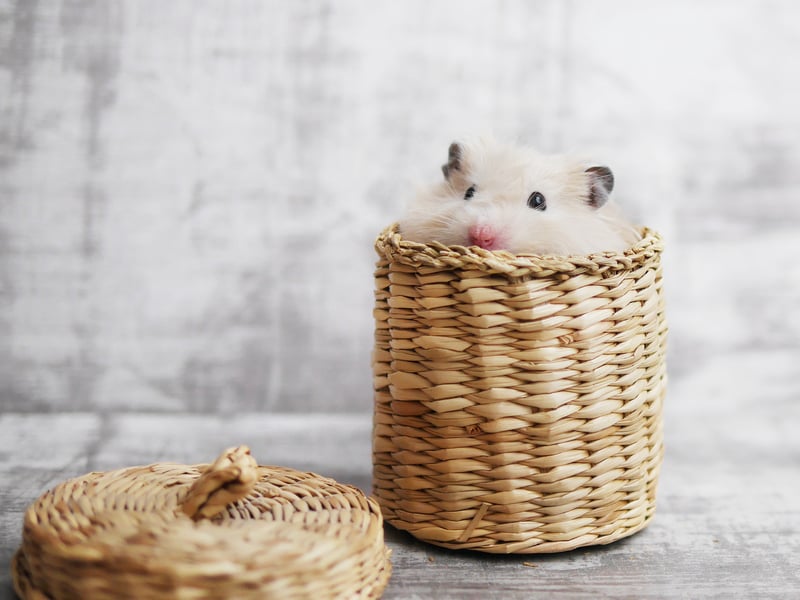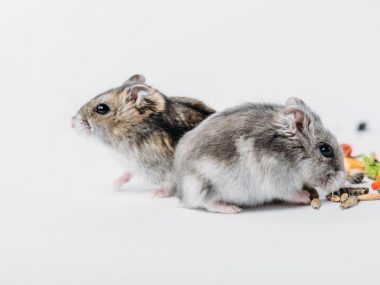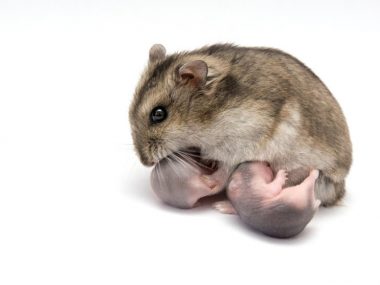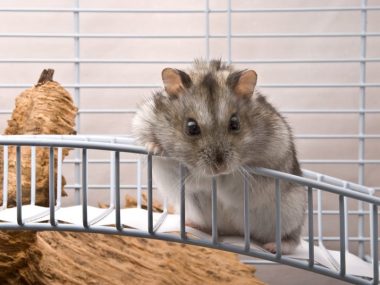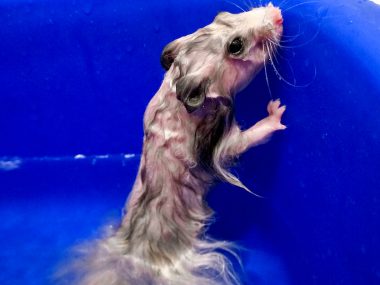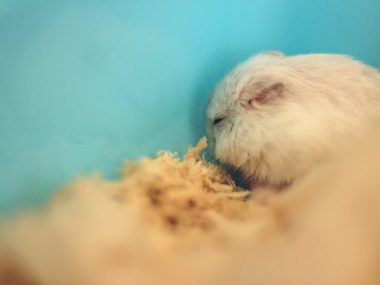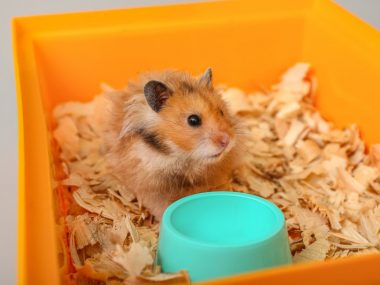If your hamster looks a little rounder than usual, you may be wondering if it’s overeating or if there may be baby hammies on the way. While it is difficult to confirm for sure until you actually spot tiny pink babies, your hamster will start sending you plenty of clues to let you know that the arrival of the next generation might not be far off.
Hamster pregnancy signs include increased appetite, nesting, and food storing. Physical changes include swollen nipples and abdomen, but these may only be observable shortly before birth. A pregnant hamster may become less friendly or even slightly aggressive while being handled.
Confirming your suspicion that your hamster is pregnant will take a bit of detective work and careful observation. Let’s go through a checklist of ways you may be able to tell if your hamster is about to become a mom.
Table of Contents
8 Signs That Your Hamster Might Be Pregnant
If left to their own devices, hamsters are prolific breeders, so it is best to keep a hamster on its own or with company of the same sex. Remember that no matter how curious or excited you may be to know if your hamster is pregnant, never prod its belly. It will be impossible to feel if there are babies inside, and it may injure the hamster and cause distress.
Work through this handy 8-point checklist to check if your cute furball is pregnant. Each time you answer yes, move to the next question.
1. Are you sure that your hamster is female?
Getting this mixed up happens more often than you think. If you need to do a double-check, read this article.
2. Is your hamster more than 6 weeks old?
Hamsters can get pregnant at less than 2 months of age, so males and females hamsters must be separated at a very young age. However, it is unlikely that your hamster will be pregnant if it is younger than 6 weeks old.
3. Has your hamster had a male hamster around in the last three weeks?
If you think you have two female hamsters, recheck the gender of the companion hamster. You would not be the first person to believe you have two females only to find one is a male. Hamsters often arrive pregnant, so if you have only recently acquired your hamster, move on to the next question.
If your hamster has been on its own for more than 23 days, it is not pregnant because the gestation period for all types of hamsters is less than 22 days. Oddly, one of the smallest hamster varieties, the Roborovski dwarf hamster, has the longest gestation of all hamsters and is pregnant for between 20 and 22 days.
4. Is your hamster eating and storing more food than usual?
A pregnant hamster will display a rapid increase in appetite. This is understandable because it is suddenly eating for two…or eight or nine! Check here to know how and how often your hamster should be eating.
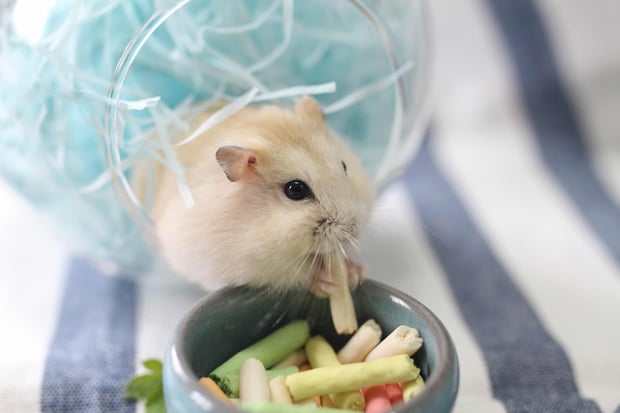
5. Is your hamster showing signs of nesting?
While the physical changes may not yet be evident to us humans, a soon-to-be hamster mom will instinctively know that she needs to prepare a cozy nest where the babies will be safe and warm.
6. Has your hamster become grumpy, irritable, or aggressive?
Understandably, a soon-to-be mom hamster may not want to be picked up or enjoy being cuddled as much as she did before. If you suspect your hamster may be pregnant, be extra gentle when handling her and if she seems agitated, put her back into her quiet cage.
7. Has your hamster suddenly gained weight?
One of the last signs of pregnancy in hamsters is increased weight. A visibly swollen abdomen means that the babies will arrive in less than a week.
Never assume that sudden weight gain on its own is because of pregnancy. Several illnesses or even an abscess or tumor could cause distention in the abdomen. A pregnant belly is usually pear-shaped, with the fat area spread evenly across the area closest to the tail.
8. Can you see your hamster’s nipples?
Hamster nipples are tiny and are not easy to see even if they are bigger than usual, especially if you have a long-haired hamster. You may feel prominent bumps on her belly if you run your finger gently along her underside.
If you have answered yes to all eight questions, you can be 99% sure that you will soon become a hamster grandparent. Provide your hamster with plenty of nutritious food and additional nesting material, and prepare for the imminent arrival of the baby hamsters.
Shortly before delivering the babies, the mother hamster will become more active and restless. You may also notice a tiny bit of blood around her vagina. This is absolutely normal and means that the babies are on the way.
Frequently Asked Questions
How Long Is A Hamster Pregnant For?
Syrian hamsters are only pregnant for 16 days, while some smaller dwarf varieties can go as long as 22 days. Learn more about five popular hamster breeds.
What Should I Do If My Hamster Is Pregnant?
The first step is to remove any other hamsters from the cage and let her make her own quiet nest where she won’t be interrupted. Provide some additional nesting materials like toilet paper and soft tissues, and the female hamster will go to work preparing a nest for the babies.
Increase the amount of available food and add some variety. Also include a few high calcium items like bits of cheese or a small amount of milk for your pregnant fairy. There must always be plenty of fresh water available.
What Do I Do After My Hamster Gives Birth?
One of the most difficult things after a hamster has given birth is to curb the urge to pick up the babies. Mother hamsters are incredibly protective, and touching her or the babies, even if you only want to admire their cuteness, will be extremely upsetting to her. It is essential not to disturb hamsters for at least a week after birth.
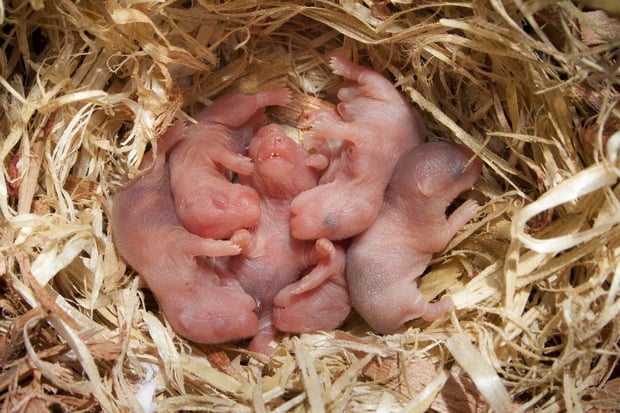
Continue to provide ample food and fresh water so the mother hamster can nurse her new babies adequately and keep them healthy.
When Can I Touch Baby Hamsters?
While it is okay to try to occasionally snatch a sneak peek of the tiny pink bundle of hamster babies, ideally, they should not be disturbed or touched until they are ready to be separated from the mother. They will become independent between 21 and 28 days of age.
Hamsters have really poor eyesight and rely on their sense of smell to make sense of the world, so avoid handling the babies while they are still dependent on their mother. A change in their scent may make her behave differently towards them.
Click here to find a detailed baby hamster growth timeline, so you know how to care for new baby hamsters.
Will Hamsters Eat Their Babies?
Unfortunately, mother hamsters do sometimes eat some of their babies. While this may seem pretty savage to us humans, it is nature’s way of limiting litter sizes. Find out more about this phenomenon here.
When Can I Clean My Hamster Cage After It Had Babies?
Resist the urge to clean out your hamster maternity cage until the babies move around and eat independently. If absolutely necessary, you can do a bit of spot cleaning of wet sections away from the babies, but do so quickly and without moving the cage about or causing too much disturbance.
Any old, stale food must be removed and topped up with fresh offerings, but try not to startle the mom hamster and keep the environment consistent and quiet. Remove and replace food quickly and leave her to continue caring for the baby hamsters quietly. It won’t be very long before you can cuddle the little bundles of cuteness.
References:
https://www.merckvetmanual.com/all-other-pets/hamsters/breeding-and-reproduction-of-hamsters
https://www.thesprucepets.com/what-should-you-do-if-your-hamster-has-babies-1238930
https://www.ncbi.nlm.nih.gov/books/NBK231928/?report=reader
